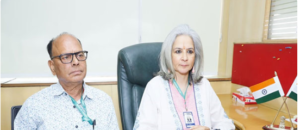Exports of India’s med-tech industry could reach USD 20 bn by 2030; sector needs govt support: CII
New Delhi, Nov 29 (PTI) India’s medical technology industry is expected to touch exports of up to USD 20 billion by 2030 but the sector needs more government incentives and further ease of doing business to accelerate overseas shipments, industry body CII said on Friday.
The production linked incentive (PLI) scheme for the medical technology sector currently available for select medical devices needs to be extended across products, while export incentives to ‘reimburse hidden costs’ need to be provided to manufacturers, CII Chairman National Medical Technology Forum Himanshu Baid told reporters here.
“Today, we are importing almost 60 to 70 per cent of our medical equipment which are needed in the country. Whereas, our manufacturing is still very low as around 30 per cent is only manufactured in the country. Our imports are far exceeding our exports. Our imports are almost USD 8 billion and our exports are close to USD 4 billion,” he said.
However, Baid said, India has the best potential to grow this industry to the next level, taking advantage of the world adopting the ‘China plus one’ strategy to reduce import dependence on one particular country.
India is very well poised to take advantage of it on the back of the talent it has in terms of software, hardware and low-cost of labour as compared to China.
On the export potential of the Indian medical technology industry, he said, “My expectation is that by 2030 India’s exports can reach around USD 15 billion to USD 20 billion dollar and our imports would reduce from USD 8 billion to USD 3 billion-USD 4 billion.”
In order to realise the potential, Baid said, “As an industry, we’re also looking for some more ease of doing business, (removal of) overlapping regulations and certain areas where they have put in QCO orders, which is also impacting ‘Make in India’ and also exports.”
Elaborating, he said the medical devices industry, which is currently governed under the Drugs and Cosmetics Act that regulates the pharma sector, needs a separate regulator.
“We are part of the pharma regulation. Drugs and pharma and medical devices are seen under the same lens. We have the same regulator. Our industry’s demand was to have a separate regulator,” he said.
Asserting that medical device is a “very complex engineering industry” with electronic, mechanical and plastic parts with different standards, he said, it is “very different from pharma which is more about chemical and pharmacopeia with a defined formulations”.
On the quality control order (QCO) issue, he said at present suppliers of raw materials need to register with BIS and then only those products can be imported into the country.
“That is causing a lot of roadblocks for local industry to manufacture products in India….At one point, the government is saying ‘Make in India’ but the raw materials suppliers are small players, who don’t have the wherewithal to go BIS and register themselves globally. So we are asking the government for exemption from QCO especially for med-tech industry,” Baid said.
He also said in order to enhance exports, the PLI for the medical devices sector needs to be extended to more products.
“Today 3,000 products are already regulated in India by CDSCO. We need PLI for almost the whole industry. When we say PLI should not be limited to very few products, the government should incentivise every manufacturing which is happening in the country to push for global markets,” Baid asserted.
In the existing PLI scheme for the medical devices sectors, he said only 28 companies were allotted and there was a budget of Rs 3,400 crore and only 10 to 20 per cent of the fund have been utilised.
“The government has a surplus budget. Please use it for pushing more exports out of the country, more manufacturing in the country. Can we enlarge the scope of the scheme to more and more products?,” he asked.
Baid also said the remission of duties under the RoDTEP scheme by the Ministry of Commerce for exports needs to be enhanced to 2-2.5 per cent from the current range of 0.5 per cent and 0.7 per cent, stating it is “not enough”.
“There are a lot of hidden costs, which are there in manufacturing in the country. What we are asking is for the government to reimburse those hidden costs. Maybe a 2-2.5 per cent incentive would be good enough to help us get through those hidden costs and be competitive,” he added.
Baid also said there is a need to improve India’s export infrastructure, saying, “we can’t be waiting for two to three weeks to ship our containers out of the country, whereas in China, it takes maybe two days or three days to ship the products out.”






